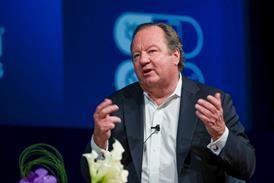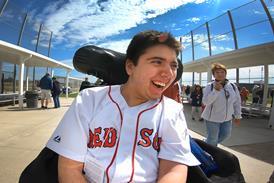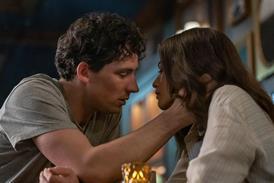Syrian residents of Homs tentatively return to the war-ravaged city in the hopes of rebuilding their lives

Dir: Anas Zawahri. Syria. 2024. 74mins
The aftermath and lingering trauma of conflict underpins this melancholic modern day snapshot of the Syrian city of Homs. It was ravaged by the country’s civil war, when a siege led to thousands of people being trapped there between 2011 and 2014. That turmoil was viscerally documented by Talal Derki in 2013’s Sundance winner Return To Homs. Now, first-time feature director Anas Zawahri – who is Palestinian-born but lives in Syria – goes back to the city to talk to some of the residents who have returned in the middle of an uneasy stalemate.
Violence still casts a visible shadow on this city and its residents
The facts and figures of the conflict are not presented, with Zawahri instead taking an anecdotal approach as a range of men and women offer their thoughts off-camera. The sense of his film continuing a conversation about Syria already begun by other documentaries means it is most likely to appeal to those who have an existing interest in the country, but should also secure it further festival play to those very audiences.
My Memory Is Full of Ghosts largely unfolds in long, measured, fixed camera shots that allow time to take in backdrops that are mostly scarred by the evidence of war. The skeletal and pockmarked remains of bombed-out buildings recall the fighting but, on the streets below, people are going about their normal business. Over this, we hear locals ruminating on their feelings, the conflict now an emotional one as they try to reconcile their love of the city and happy memories there with experiences of trauma and their hopes for the future. This slow approach may not win over casual audiences but gives space for the interviews to gain resonance, while the use of only ambient sound further ensures there are no distractions from what is being said.
“Fear is the only feeling that I’ve failed to handle,” says one woman, adding, “I did well with sadness and rage.” A male contributor notes, as the camera surveys an empty cafe, that Homs is “no longer the city of laughs”, its social life irrevocably shattered by grief. Periodically, individuals or groups of people – presumably some of those whose voices we hear, although it’s never overtly indicated and the interviewees don’t speak directly to the camera – pose as though for a still photograph. Some of those in front of the camera stare directly down the lens in a moment of connection, while others engage in banter which offers the film’s only note of levity.
The multiple viewpoints give depth to the documentary, and the gender balance is admirably even-handed. A blind interviewee also offers a unique perspective, explaining how his return to the city was very different from the sighted people he was travelling with, as he experienced its devastation through the reactions of those around him. The film is peppered with stories of intense personal loss, which notably span the generations. One man talks about the agony of his brother dying in detention. A woman speaks of the unexpected and senseless killing of her mother, while another outlines how she tries to cope with the loss of her children.
Signs of hope may be few, but they are there – not least underlined by the people who have chosen to return to Homs despite their traumatic experiences. There is rebuilding work going on in some areas and children are in evidence, which speaks to future potential. Some are playing a game of football, while elsewhere a young lad fixes a delicate chandelier outside a shop while an older fatjer, presumably his dad, works inside. These nods to community resilience are small bright spots in a bleak documentary, which highlights the fact that violence still casts a visible shadow on this city and its residents.
Production companies: Wind Cinema, Harmony Cultural Forum
International sales: Wind Cinema distribution@windcinema.com
Producers: Ahmad Alhaj, Kamel Awad
Cinematography: Hamzeh Ballouk
Editing: Ali Kazwini
























